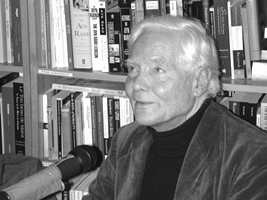W. S. Merwin made his first appearance at the Village Voice bookstore on May 27, the same evening a hailstorm hit Paris. Merwin is the author of 20 books of poems, four books of prose, and nearly 20 books of translations, including one of the Middle English Sir Gawain and the Green Knight, which is scheduled for publication in October by Knopf. Born in New York and raised in New Jersey and Pennsylvania, the 75-year-old poet has won many of the major literary awards available-the Pulitzer, Bollingen, and Tanning prizes among them.

Merwin was on his way back to Hawaii-where he has lived, in Maui, since 1976-after a vacation of several weeks at his country home in the Haut-Quercy region of France. Much of what he read that night, a selection of poems spanning his 50-year career, was tied to France in one way or another.
Merwin’s friend Michèle Laforest provided one of three introductions for the poet (together with Village Voice owner Odile Hellier and poet and memoirist Jeffrey Green). Laforest recounted the story of first meeting Merwin “many, many years ago” when they were both residents of a tiny French hamlet in the Dordogne River valley. “We have a poet in the village, an American poet,” Laforest recalled saying in amazement. “Even if we have changed, that feeling of wonder and friendship has remained,” she said.
Wearing a dark green corduroy jacket and a black turtleneck, his easy-going, kindly manner apparent in all of his remarks, Merwin entertained questions from the audience before reading his poetry. He recalled his formative years as a poet and mentioned his peers—Adrienne Rich, Galway Kinnell, James Merrill, Maxine Kumin, Carloyn Kizer—all born in the 1920s. He said that, unlike the members of the New York School of the 1950s, “there was never a moment when we all got together and decided to write a certain way.” He did admit, half-jokingly, that Robert Bly had “bullied” James Wright into changing his style. The entire generation had been affected, Merwin said, by Spanish surrealism and South American writers such as Pablo Neruda.
David Applefield, the editor of Frank magazine, quoted from an interview with Merwin that he had published in Frank more than a decade ago. Applefield had asked Merwin then if contemporary American poetry responded to the social and political issues of the time, and wondered now if Merwin would update his comments.
“In response to the Vietnam War, there was an enormous outpouring of very bad poetry,” Merwin said of that period in American letters. “I’m glad it happened. If it hadn’t, there would have been a sense of indifference. But we should not pride ourselves on our political statements.”
Merwin then read some of his poems, not so much reciting as intoning his work. His sonorous voice lulled the full house. He first read from his books of poems published in the 1960s and ’70s (now collected as The First Four Books of Poems and The Second Four Books of Poems, both published by Copper Canyon Press). He then read from Travels (1993), The Vixen (1996), The Pupil (2001), and finished with new, unpublished work-some of which he wrote while in France, inspired by the world’s post-9/11 situation.
“I always hope that the most recent ones are the most interesting,” Merwin said.







